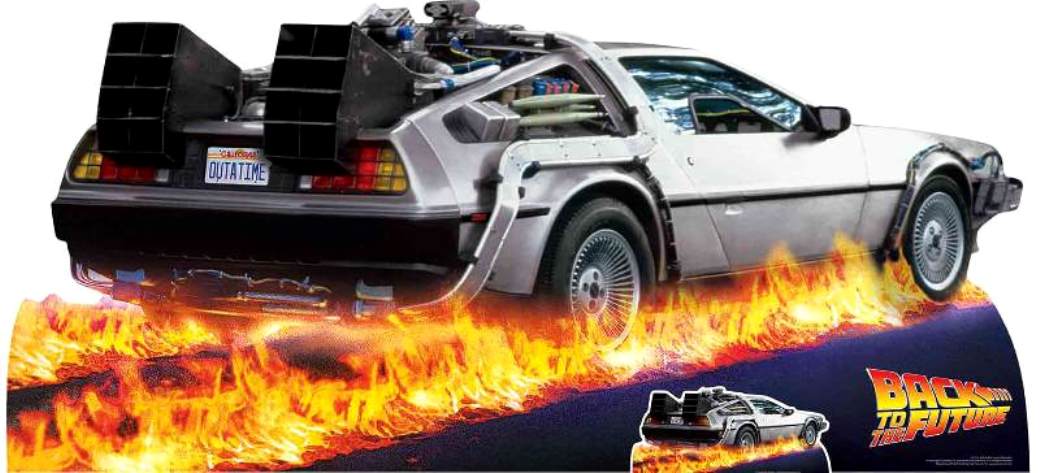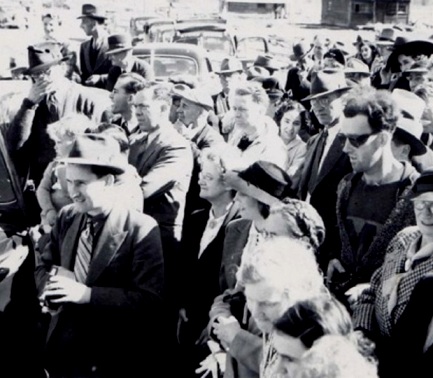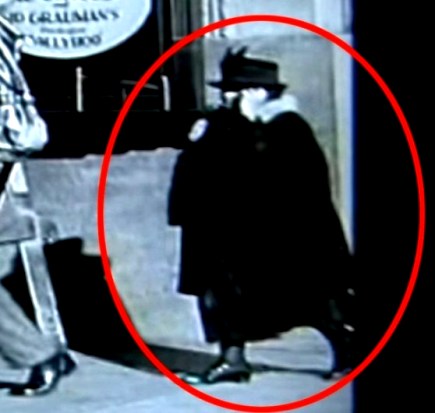

On this month's Oddities in the News Page:
Paradox-Free Time Travel is Theoretically Possible, Researchers Say
IN THE ODDITIES ARCHIVES
Almost Buried Alive
Time to Kill the Penny?
Circling Ships
Red Hair
Animals and Coronavirus
Dog Noses


NPR, Matthew S. Schwartz --"The past is obdurate," Stephen King wrote in his book about a man who goes back in time to prevent the Kennedy assassination. "It doesn't want to be changed."
Turns out, King might have been on to something.
Countless science fiction tales have explored the paradox of what would happen if you went back in time and did something in the past that endangered the future. Perhaps one of the most famous pop culture examples is in Back to the Future, when Marty McFly goes back in time and accidentally stops his parents from meeting, putting his own existence in jeopardy.
But maybe McFly wasn't in much danger after all. According a new paper from researchers at the University of Queensland, even if time travel were possible, the paradox couldn't actually exist.
Researchers ran the numbers and determined that even if you made a change in the past, the timeline would essentially self-correct, ensuring that whatever happened to send you back in time would still happen.
"Say you traveled in time in an attempt to stop COVID-19's patient zero from being exposed to the virus," University of Queensland scientist Fabio Costa said.
"However, if you stopped that individual from becoming infected, that would eliminate the motivation for you to go back and stop the pandemic in the first place," said Costa, who co-authored the paper with honors undergraduate student Germain Tobar.
"This is a paradox — an inconsistency that often leads people to think that time travel cannot occur in our universe."
A variation is known as the "grandfather paradox" — in which a time traveler kills their own grandfather, in the process preventing the time traveler's birth.
The logical paradox has given researchers a headache, in part because according to Einstein's theory of general relativity, "closed timelike curves" are possible, theoretically allowing an observer to travel back in time and interact with their past self — potentially endangering their own existence.
But these researchers say that such a paradox wouldn't necessarily exist, because events would adjust themselves.
Take the coronavirus patient zero example. "You might try and stop patient zero from becoming infected, but in doing so, you would catch the virus and become patient zero, or someone else would," Tobar told the university's news service.
In other words, a time traveler could make changes, but the original outcome would still find a way to happen — maybe not the same way it happened in the first timeline but close enough so that the time traveler would still exist and would still be motivated to go back in time.
"No matter what you did, the salient events would just recalibrate around you," Tobar said.
The paper, "Reversible dynamics with closed time-like curves and freedom of choice," was published last week in the peer-reviewed journal Classical and Quantum Gravity. The findings seem consistent with another time travel study published this summer in the peer-reviewed journal Physical Review Letters. That study found that changes made in the past won't drastically alter the future.
Bestselling science fiction author Blake Crouch, who has written extensively about time travel, said the new study seems to support what certain time travel tropes have posited all along.
"The universe is deterministic and attempts to alter Past Event X are destined to be the forces which bring Past Event X into being," Crouch told NPR via email. "So the future can affect the past. Or maybe time is just an illusion. But I guess it's cool that the math checks out."
See more HERE


Many people have seen the above photo of a seemingly "time-traveling" Hipster in the 1940s, and the woman on a cell phone in Charlie Chaplin's 1928 silent film The Circus. These photos ares explained HERE
So, is time travel possible?
If Isaac Newton's absolute space and time had been the correct picture of nature, we could simply say that traveling backwards in time was impossible, and that would be the end of it. But in Einstein's curved-spacetime universe, things are more flexible. From your own personal, subjective point of view, you always more forward in time — more technically, you move on a timelike curve through spacetime.
But the large-scale curvature of spacetime caused by gravity could, conceivably, cause timelike curves to loop back on themselves — that is to say, become closed timelike curves — such that anyone traveling on such a path would meet themselves in the past. That's what respectable, Einstein-approved time travel would really be like.
Of course, there's still the little difficulty of warping spacetime so severely that you actually create closed timelike curves; nobody knows a foolproof way of doing that, or even whether it's possible, although ideas involving wormholes and cosmic strings and spinning universes have been bandied about.
I'm only going to say this once: There would be no flashing lights. At least, there would only be flashing lights if you brought along some strobes, and decided to start them flashing as you traveled along your closed timelike curve. Likewise, there is no disappearance in a puff of smoke and re-appearing at some other time.
Traveling through time is just like traveling through space: You move along a certain path, which (we are presuming) the universe has helpfully arranged so that your travels bring you to an earlier moment in time. But a time machine wouldn't look like a booth with spinning wheels that dematerializes now and rematerializes some other time; it would look like a rocket ship. Or possibly a DeLorean, in the unlikely event that your closed timelike curve started right here on Earth and never left the road.
Think of it this way: Imagine there were a race of super-intelligent trees, who could communicate with each other using abstract concepts but didn't have the ability to walk. They might fantasize about moving through space, and in their fantasies "space travel" would resemble teleportation, with the adventurous tree disappearing in a puff of smoke and reappearing across the forest. But we know better; real travel from one point to another through space is a continuous process. Time travel would be like that.
What about age?
If you travel through time, and you bring along with you some clocks or other objects, all those things experience time in exactly the same way that you do. In particular, both you and the clocks march resolutely forward in time, from your own perspective. You don't see clocks spinning wildly backwards, nor do you yourself "age" backwards, and you certainly don't end up wearing the clothes you favored back in high school.
Your personal experience of time is governed by clocks in your brain and body — the predictable beating of rhythmic pulses of chemical and biological processes. Whatever flow of time is being experienced by those processes — and thus by your conscious perception — is also being experienced by whatever accompanies you on your journey.
See more HERE